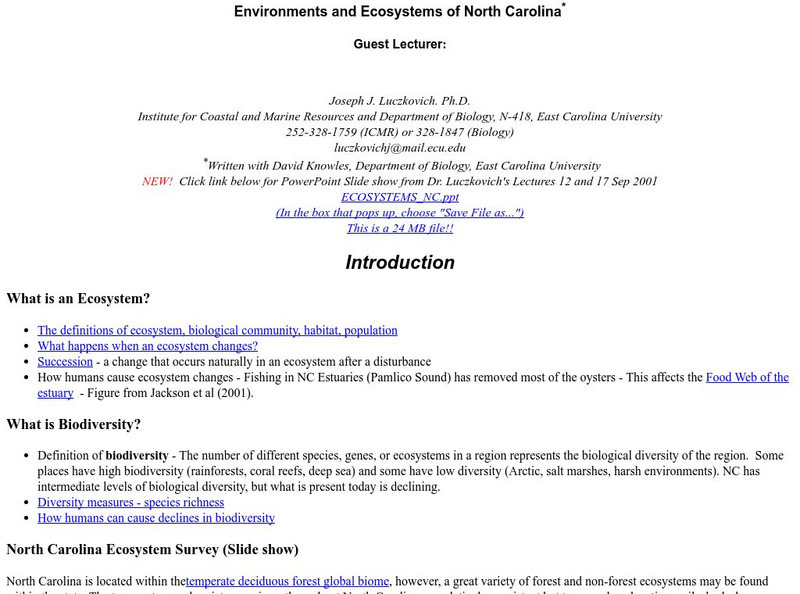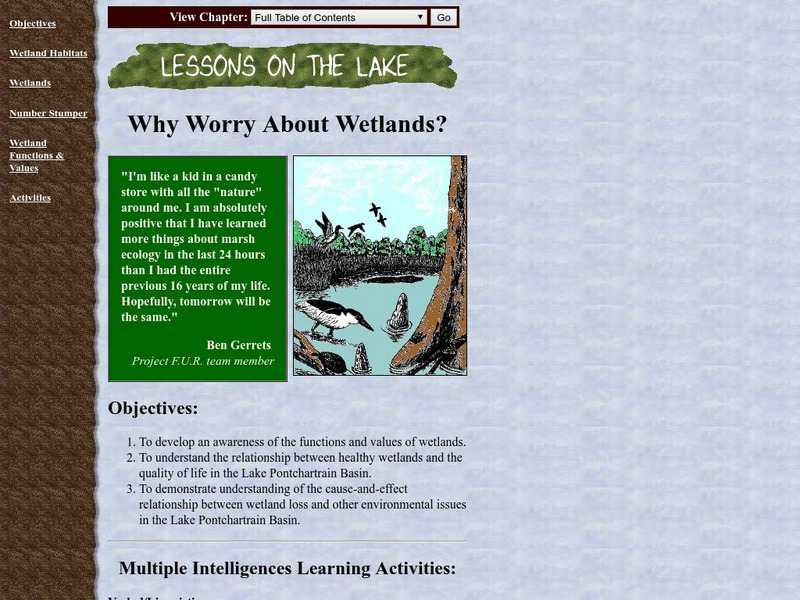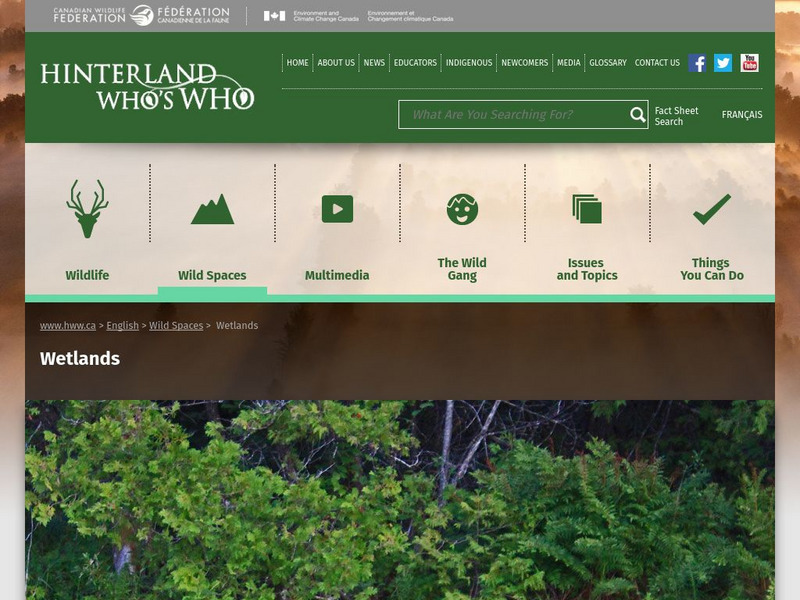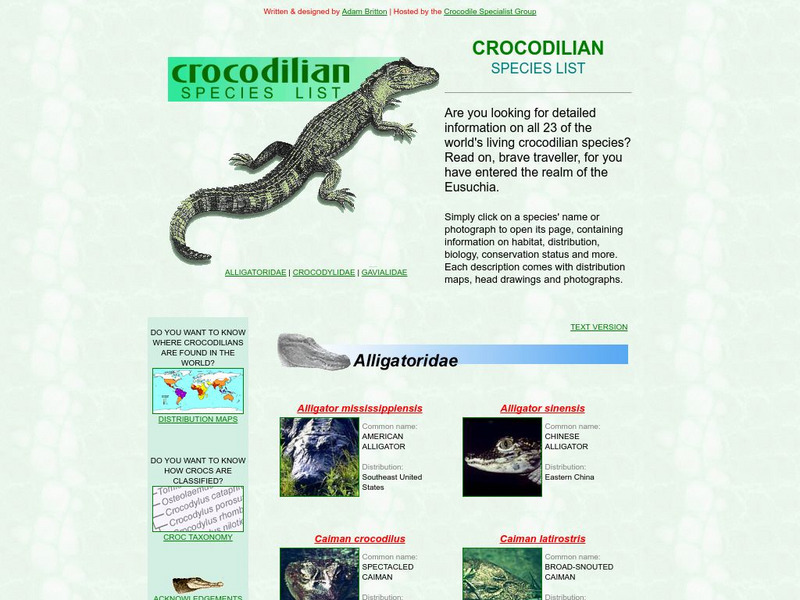Science Education Resource Center at Carleton College
Serc: Fish Habitats
During this lesson, students spend time looking at pictures of fish and their habitat, talking about what all animals need to live, making a poster of a fish habitat, and finally visiting a lake.
A-Z Animals
A Z Animals: Reference: Habitats: Swamps and Wetlands
Learn about the plants, animals, and other characteristics of some wetland ecosystems.
Other
Environments and Ecosystems of North Carolina
North Carolina is located within the temperate deciduous forest global biome, however, a great variety of forest and non-forest ecosystems may be found within the state. The temperature and moisture regimes throughout North Carolina are...
Ducksters
Ducksters: Science for Kids: Freshwater Biome
Kids learn about the freshwater aquatic biome. Ecosystems such as rivers, streams, ponds, lakes, wetlands, swamps, and bogs.
BBC
Bbc Nature: Wildlife: Rivers and Streams
Take a close-up look at the world of rivers and streams and discover what lives there and where you can find them through pictures, news, descriptions, and external links.
Environmental Education for Kids
Eek!: Lake Superior
This site provides facts, illustrations, and more about the largest Great Lake. Includes descriptions of wildlife and industry. For grades 4-8.
BBC
Bbc Nature: Wildlife: Wetlands
Take a close-up look at the world of wetlands and discover what lives and grows there through videos, pictures, news, descriptions, and external links. Listen to the various sounds that occur in wetlands.
abcteach
Abcteach: Ponds
[Free Registration/Login Required] The abcteach directory contains sample pages from their pond unit for non-members. Handouts are in PDF format.
Science Buddies
Science Buddies: Home Sweet Biome: How Do Plants Grow in Different Environments?
In this science fair project you will learn about biomes and how different climatic conditions affect plant growth. This can explain why some plants and animals are similar in different areas of the country, and in other parts they are not.
CK-12 Foundation
Ck 12: Life Science: Aquatic Biomes
[Free Registration/Login may be required to access all resource tools.] Aquatic biomes can be generally classified based on the amount of salt in the water. Freshwater biomes have less than 1% salt and are typical of ponds and lakes,...
NASA
Climate Kids: 10 Interesting Things About Ecosystems
Discover 10 interesting things about ecosystems, including features of coral reefs, rainforests, deserts, grasslands, freshwater ecosystems, the tundra, the ocean floor, wetlands, boreal forests and big cities.
Science Education Resource Center at Carleton College
Serc: Macroinvertebrates and Indicators of Water Quality
During this field activity, students will examine different aquatic habitats, collect and identify macroinvertebrates from each and use an index to determine water quality. They will also be able to explain the meaning of tolerant and...
US Geological Survey
Lake Pontchartrain Basin Foundation: Why Worry About Wetland?
Help students understand the functions and values of wetlands through these multiple intelligences learning activities. The site also includes information about the wetland habitats, commercial values, water quality, and erosion control.
Other
Minnesota Department of Natural Resources: Largemouth Bass
This "snapshot" of large mouth bass emphasizes its desirability as a sport fish, and its habitats and feeding patterns.
TED Talks
Ted: Ted Ed: What's So Great About the Great Lakes?
The North American Great Lakes- Huron, Ontario, Michigan, Erie, and Superior- are so big that they border 8 states and contain 23 quadrillion liters of water. They span forest, grassland, and wetland habitats, supporting a region that's...
PBS
Nh Pbs: Nature Works: Estuaries
Learn more about estuaries when you visit this informative site. This resource provides locations of and weblinks to estuaries in the United States.
CK-12 Foundation
Ck 12: Biology: Biomes Study Guide
This comprehensive study guide covers the main terms and concepts needed for a unit on biomes.
BBC
Bbc Nature: Wildlife: Lakes and Ponds
Take a close-up look at the world of lakes and ponds and discover what lives and grows there through pictures, news, descriptions, and external links.
BBC
Bbc Nature: Wildlife: Swamp
Take a close-up look at the world of swamps and discover what lives and grows there through pictures, descriptions, and external links. Listen to the various sounds made in swamps in different locations.
Michigan Reach Out
Bottle Habitat
Young scholars create and observe an aquatic habitat. After recording observation students graph the changes.
Ducksters
Ducksters: Science for Kids: World Biomes and Ecosystems
Kids learn about the world's biomes and ecosystems. The network of life and biodiversity needed for all to survive.
Canadian Wildlife Federation
Hinterland Who's Who: Wetlands
Learn about Canada?s wetlands, what they are and where they are located. Wetlands are divided into two classes: freshwater and saltwater. They are further separated into four main types: ponds, marshes, swamps, and peatbogs. Discover the...
Other
Crocodilian Species List
This website offers in-depth information and photos on all living crocodilian species.
PBS
Bill Moyers Reports: Earth on Edge
PBS presents this report by Bill Moyer on the current state of the earth. Information is provided on each of the planets ecosystems as well as ways to get involved. You are even able to access portions of the program that was aired.























